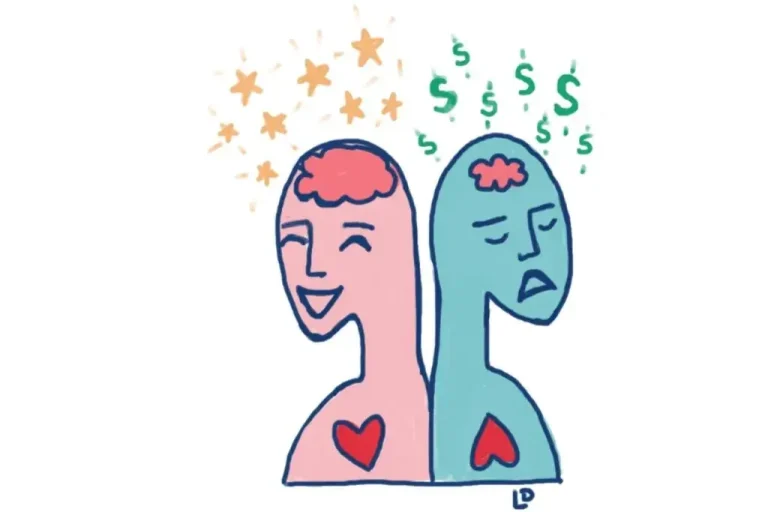
Harnessing
Intrinsic Motivation for Sustainable Happiness
You’ve probably experienced intrinsic motivation without knowing how to define it. Why do some tasks energize you while others feel burdensome? The secret lies in intrinsic motivation, our internal drive that propels us to engage in activities for the sheer pleasure, joy and satisfaction they offer, rather than for external rewards. In this blog, we’ll talk about how we can tap into our intrinsic motivation to boost your sense of purpose, drive and overall happiness.
What is Intrinsic Motivation?
Intrinsic motivation is the kind of motivation that comes from within, driven by personal satisfaction, values and interests, rather than external rewards or consequences. Imagine reading a book because you’re captivated by the story, not because you have to write a report on it. That’s intrinsic motivation!
Motivation, Fear & Reward
Did you know that our brains are wired to respond to intrinsic motivation? When we engage in activities that we find intrinsically rewarding, certain areas of our brain light up with activity. This internal reward system is crucial for our learning as well as our happiness.
Extrinsic motivation is driven by external factors like money, grades, or approval. This is how most of our behavior is shaped in our day to day lives. However, this is one reason many people report feeling burnt-out or depressed. Motivation that is driven by fear can have a strong and influential impact. However, this type of motivation is less sustainable since people will make efforts to avoid their interaction with that fear-based task (i.e., calling out of work, quitting a job, or leaving a toxic relationship).
Other types of motivation, such as obligation-driven or fear-based motivation, are also unsustainable as they are rooted in external pressures rather than internal desires. These forms of motivation might produce short-term results but often lead to burnout, disengagement, and a lack of fulfillment over time. For lasting motivation and true satisfaction, building on autonomy and sense of purpose will nurture intrinsic motivation. This doesn’t mean that stress, pressure and even a bit of fear are “bad”. Pressure, expectations and healthy challenges often compliment our inherit desire to grow, learn and achieve.
Mastery: The Drive to Improve
Mastery, a relentless pursuit of self-improvement, is a core aspect of intrinsic motivation. Mastery is motivated by challenging yourself to enhance your skills, experiencing the rewards of growth and is driven by personal desire rather than external compulsion.
The Power of Purpose
Purpose steers intrinsic motivation. It’s about finding meaning and direction in your actions. When your activities resonate with your purpose, intrinsic motivation naturally follows.
Intrinsic Motivation in Everyday Life
Intrinsic motivation isn’t limited to grand ambitions; it’s also about finding joy in daily tasks. Whether it’s cooking, gardening, or organizing, engaging in activities you love can make everyday life more rewarding.
Purpose
Purpose guides intrinsic motivation by providing us with a sense of direction and meaning, making our activities and goals feel significant and worthwhile. When our actions are aligned with a deeper sense of purpose, they transcend mere tasks or hobbies; they become expressions of our core values and aspirations.
Purpose acts as a powerful motivator because it connects our day-to-day actions to a larger, more meaningful picture, giving us a reason to persevere even when faced with challenges. In essence, when we find purpose in what we do, our motivation comes from within, making it more sustainable and rewarding.
Autonomy
Autonomy plays a pivotal role in intrinsic motivation, as it plays on our desire for freedom and independence to make choices and decisions that resonate with our true selves. When we feel autonomous, we are more likely to engage in activities that align with our personal interests and values, thereby fueling our intrinsic motivation. This sense of self-direction and control allows us to feel that our actions are our own, not imposed or dictated by external forces.
In an environment where autonomy is respected and encouraged, intrinsic motivation flourishes, leading to higher levels of engagement, creativity, and satisfaction. It’s the difference between doing something because you want to and doing it because you have to, which is a key factor in feeling genuinely motivated and fulfilled.
Sustaining Intrinsic Motivation
Maintaining motivation can be challenging, especially when obstacles arise. Remembering why we started and what we enjoy about our pursuits can help us overcome these hurdles and find intrinsic satisfaction.
Intrinsic motivation can be hindered by several factors, such as a lack of autonomy, overly controlling environments, and a disconnect from personal values or interests. When individuals feel that their freedom to choose or express themselves is restricted, their intrinsic motivation can wane.
Additionally, an overemphasis on external rewards, such as financial incentives or recognition, can overshadow intrinsic motivation, leading to a reliance on extrinsic motivators. This shift can be detrimental, as extrinsic motivation is often less sustainable in the long run. It tends to be contingent on external factors that may change or cease to exist, potentially leaving individuals without the drive to continue.
The Link Between intrinsic motivation & happiness
When we engage in activities driven by intrinsic motivation, we experience a deep sense of fulfillment and contentment. This type of motivation aligns with our personal interests, values, and passions, leading to a more authentic and satisfying experience. As we engage in tasks for the sheer joy and satisfaction they bring, rather than for external rewards, we find ourselves immersed in a state of flow, where time seems to stand still, and we are completely absorbed in the moment. This immersion not only enhances our performance but also contributes significantly to our overall well-being and happiness.
Intrinsic motivation, therefore, is not just about achieving goals but about finding joy and meaning in the journey towards those goals, which is a key component of a happy and fulfilling life.

Intrinsic Motivation in the Workplace
Intrinsic motivation in the workplace is a key driver of job satisfaction and productivity. Employers can foster this by creating an environment that values skill development, autonomy, and recognition of employees’ internal motivations. When employees feel that their work aligns with their personal values and interests, they are more engaged and motivated. Providing opportunities for professional growth, acknowledging achievements, and offering tasks that challenge and enrich employees’ skills can significantly boost intrinsic motivation. Additionally, allowing employees to have a say in their work and respecting their ideas fosters a sense of autonomy, purpose and belonging, further enhancing their intrinsic motivation and, consequently, their overall job performance and satisfaction.
FAQ's About Therapy in New Jersey
Where are you located? I need a therapist near me
We are fully online, which means that your therapy sessions will be help via video call on our HIPAA compliant Platform. Anyone in New Jersey can access our therapy services
How do I get started as a new client?
New Clients can reach out to us directly via call, text or email here:
Does my insurance cover my visits?
We provide”Courtesy Billing” for clients who are using the Out-of-network insurance benefits.
Our Insurance Page shares a small blurb about Why We Left Insurance Panels
What are out-of-network benefits?
When using OON benefits, patients typically pay the full cost of the treatment upfront and then file a claim with their insurance company for reimbursement. The amount of reimbursement can vary depending on the plan, but it can sometimes be as high as 90%. Call your insurance to see if you have OON benefits or click here to call us and we can check for you!
Is Online Therapy As Effective As In-Person Therapy?
Online therapy is essentially face-to-face counseling, just conducted remotely. Studies show that tele-therapy is as effective as traditional counseling. Professional organizations and state governments recognize its benefits and have set regulations for it. However, like any therapy, its success in achieving your goals isn’t guaranteed. It’s important to discuss with your therapist whether tele-therapy is working for you.
How Should I Prepare for My First Session?
Showing up is all that you need to do! But if you really want to get the most out of session, it could help to take some time to think about what you want from therapy. It helps to write down your goals, questions you have or things that you feel are important to share.
Do you offer traditional talk therapy?
of course! though we have some unconventional therapy approaches, we are rooted in evidenced based practices. Talk therapy is a major player in the therapy room! See What we Treat and Integrative Services for more information
Is Virtual Counseling Suitable for Everyone?
Online therapy might not be as effective for individuals with chronic suicidal thoughts, severe trauma, significant mental health history, or those recently in intensive care. Such cases often benefit more from traditional, in-person counseling. We’ll help you decide if our online services are right for you during your intake and evaluation.
Can I Change Therapists If I'm Not Happy?
Yes, you can switch therapists to another provider within the practice, or we can provide you a referral if preferred. We want to ensure that your time and effort are well spent, and that you are getting the relief you need, that’s why we work collaboratively with each other in the practice, as well as outside therapists who we know and trust.
How Do I Know If Therapy Is Helping?
You should feel like you’re making progress. Signs it’s working include:
- Feeling comfortable talking to your therapist
- Your therapist respects boundaries
- You’re moving towards your goals
- You feel listened to
You’re doing better in life - Your self-esteem is getting better
What is your cancellation policy?
We ask that clients provide at least 24 hours notice in the event that they need to cancel to avoid the 50% cancellation fee. we understand that life happens and do our best to be flexible & reschedule.
What Geographic Areas Are Served?
Currently, we serve clients in New Jersey and are expanding to other states as telehealth laws evolve. While telehealth offers the convenience of attending sessions from anywhere, state laws require clients to be in-state during their session.
Is Online Therapy Easy to Use for Non-Tech-Savvy People?
Yes, it’s pretty simple to access sessions. You’ll need basic internet skills, such as opening and visiting the patient link sent to you via email. It’s similar to video chatting like Facetime or Zoom. We can also walk you through it on the phone the first time to ensure a strong connection
What Questions Should I Ask My New Therapist?
Feel free to ask anything. Some good questions are:
- How often will we meet?
- What do you specialize in?
- What experience do you have with my issue?
- What outcomes can I expect?
- How will I know I’m progressing?
- How long do you usually work with clients?
- How will we set my treatment goals?
What is the difference between associate therapists & fully licensed therapists?
Our Qualifications:
Our founder, Rebecca Sidoti, is a highly qualified, state-licensed therapist and supervisor with extensive training in anxiety related disorders and innovative treatment such as Ketamine Therapy. Mind by Design Counseling adheres to standards set by the our governing counseling boards.
To see each providers credentials, training and licenses, visit our “Meet the Therapists” Page to learn more.
- LAC/LSW are therapists who may practice clinical work under the supervision of a fully licensed therapist.
- LPC/LCSW are therapists who have completed the necessary clinical hours post-graduation under supervision and can practice clinical work independently.











